Google E-E-A-T is the recent update to the quality rater guidelines.
The most important change consists of the letter E added to the start of the popular acronym E-A-T (expertise, authoritativeness, and trustworthiness).
The introduction of the “first-hand experience” is designed to help raters better understand how Google defines high-quality content.
This guide will discuss what this means for your website and how to increase your E-E-A-T to improve your SEO.
Contents:
What is Google E-E-A-T?
Google E-E-A-T stands for Experience, Expertise, Authoritativeness, And Trust.
Want to know a secret?

Our systems aren't looking for EAT. Our raters are using that to see if our systems are working well to show good information. There are many different signals that, if we get it right, align with what a good human EAT assessment would be. See also: https://t.co/1fs2oJ9Gtl pic.twitter.com/GBbnYEjJUV
— Danny Sullivan (@dannysullivan) February 19, 2020
Rather, it is an important part of Google’s Quality Rater Guidelines.
These are used by human raters to assess the quality of websites and search engine results pages (SERPs).
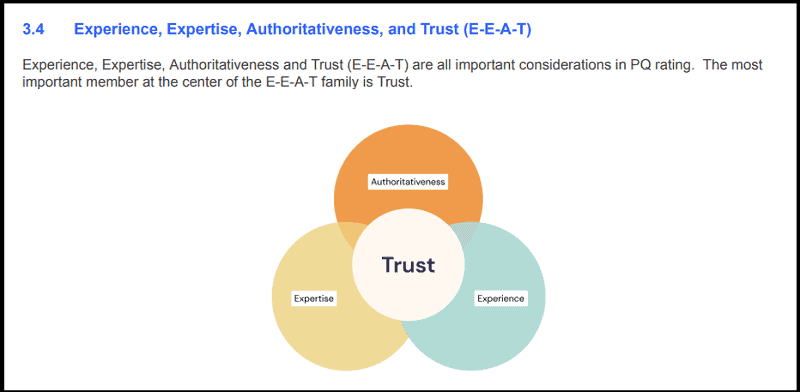
Google’s raters look at the expertise, authoritativeness, trust, and first-hand experience of content to determine if it is high quality.
In short, this is what each key factor means:
- Experience. Content should include first-hand experiences from the author or other users that can provide valuable insight.
- Expertise. The author must have the relevant expertise and knowledge to write about a particular topic or provide a solution.
- Authoritativeness. Content should come from an authoritative source with a good reputation in the industry and must be supported by other credible sources.
- Trust. Content should be accurate, up-to-date, and free from misinformation or malicious intent.
Experience
Site owners should demonstrate first-hand experience to better inform readers and provide accurate information.
By adding “experience” to the equation, Google can determine if the content is of quality by analyzing how familiar and knowledgeable the creator is on a particular topic.

This will help readers to better trust your content and give them an accurate and reliable source of information.
In fact, Google acknowledges that trust is the core component of E-E-A-T and should be prioritized above all other aspects.
Expertise
Content creators should demonstrate relevant expertise to provide accurate information and insight.
For example, if someone is writing a blog post about medical treatments for diabetes, the author must have the relevant knowledge and qualifications.
This could include having experience working as a medical professional or in a related field.
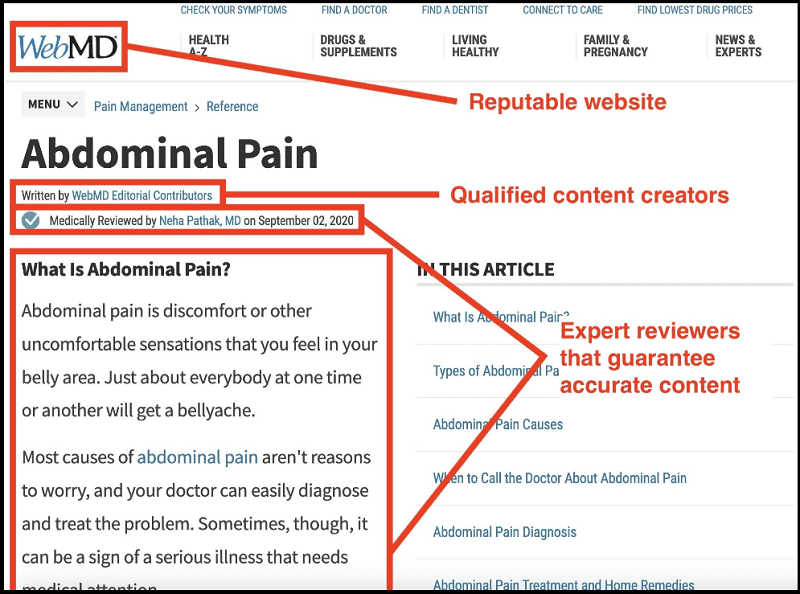
Authoritativeness
Content should be sourced from a reliable and reputable authority in the industry, backed up by other credible sources.
For example, if you’re writing a blog post about technology, it should be connected with references to authoritative websites such as Wired or Mashable.
This helps Google verify your content’s accuracy and likely rank it better in SERPs.
Trust
Content should be detailed, up-to-date, and free from bad information.
Authors must do their research before writing to avoid using inaccurate information that could mislead readers.
Remember that Google can easily recognize when content is duplicated, false, or misleading and will devalue the website accordingly.
Additionally, authors should make sure their content doesn’t contain any links to malicious sites which could pose a threat to readers (check spam policies, from Google Search Essentials).
How Raters Asses “Content Quality”?
Quality Raters use Google guidelines (including the E-E-A-T acronym) to evaluate the content quality of a website.
They look at factors such as expertise, authoritativeness, trustworthiness, and experiences when assessing a website for ranking in SERPs.
The raters also analyze elements such as readability, accuracy, grammar, and content structure to determine the overall quality of a website.
Google Quality Raters are important because they provide an unbiased opinion on how well a website meets the criteria set forth by E-E-A-T.
This allows Google to ensure its search results are accurate and relevant.
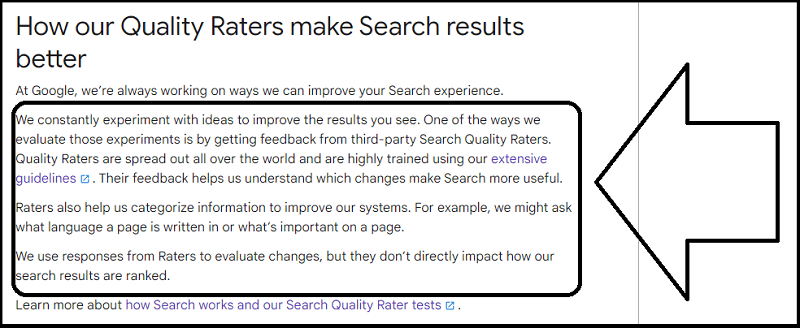

Take for example this extract from the earlier edition:
“For all types of webpages, creating high quality MC takes a significant amount of at least one of the following: time, effort, expertise, and talent/skill.”
It’s interesting to note that, in the latest version, the word “time” has been removed and the term “originality” has been included instead:
“For most pages, the quality of the MC can be determined by the amount of effort, originality, and talent or skill that went into the creation of the content.”
With Google’s focus on creating original content this year, the addition of a new table evaluating page quality is not a surprise.
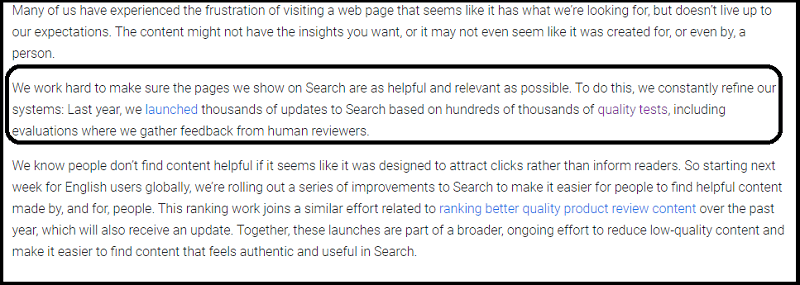
And if we dig a little deeper, we can find this section, which outlines how to evaluate web pages, ensuring that they are up to date with quality standards:
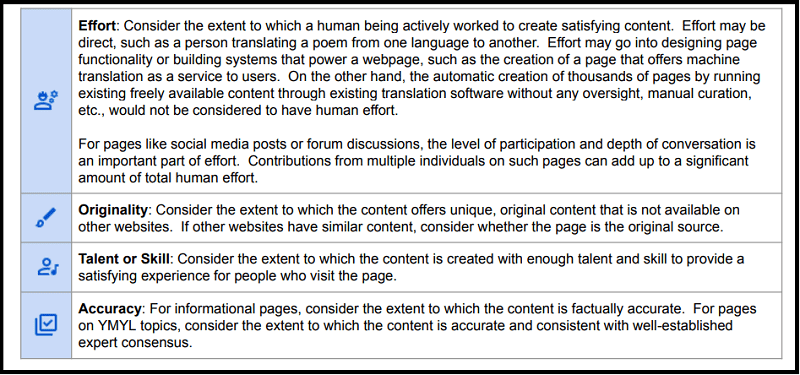
There’s a strong emphasis on the “effort” section, accompanied by an explicit description of what effort does (and doesn’t) look like (and this is the biggest change seen in this new version of the QRG).

Google is now placing greater emphasis on the originality and uniqueness of content, rewarding websites with exclusive ideas and perspectives.
Improve Your Website’s E-E-A-T
When it comes to ranking your website, the quality of content is just as important as other elements such as technical set-up, link building, and keyword optimization.
To improve your website’s E-E-A-T, you can follow these recommendations:
- Start with the About Page
- Collaborate with Experts
- Moderate UGC
- Update Old Content
- Link to Authoritative Source
- Consider All Topic Angles
- Build Your Online Reputation
Start with the About Page
The search quality guidelines make clear that Google wants to establish who is responsible for creating content and if that individual or website can be identified as a reliable source for that knowledge.
It’s essential to have an “About Us” page that explicitly outlines who you are or who is on your team, as well as who are the content creators.
If you haven’t already done this, now is the perfect time to do so!

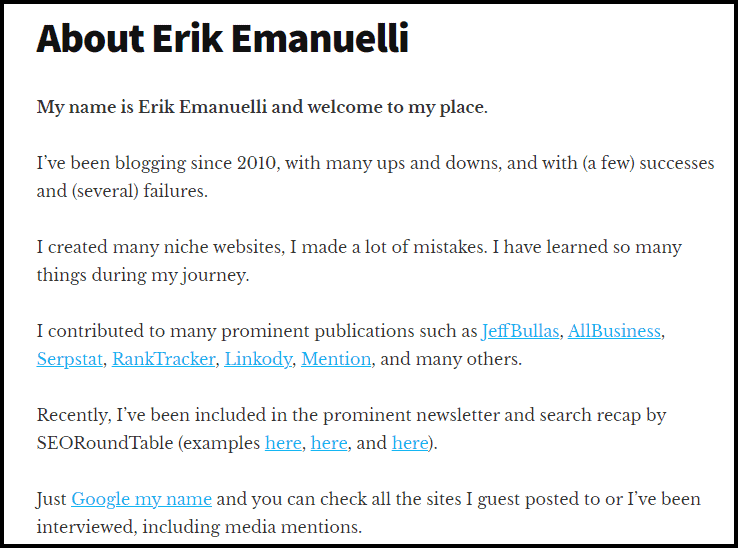
You can also include awards/recognition for which you or the company have received, as well as any certifications or credentials that add credibility to your brand.
Also, be sure to follow these best practices:
- Make It Simple and Easy to Read
- Bring Facts to the Table
- Include Multimedia
- Make It Visible
Make It Simple and Easy to Read
Your About page should be straightforward to read.
Keep the language simple and avoid complicated jargon.
Tell a story, exactly as the reader was in front of you.
Bring Facts to the Table
Your About page should be full of facts about who you are and why customers should trust you or your business. Share testimonials.
Showcase a few remarkable successes or inspiring stories that will truly captivate readers.
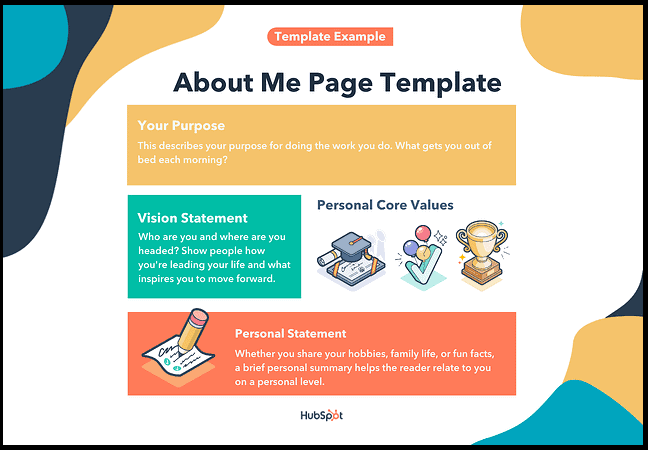
Include Multimedia
Adding multimedia, such as video, and audio can help bring your About page to life.
An image of yourself and your team is a must.
A smiley, good-looking picture will help you build a connection with readers.
Make It Visible
Be sure to make it easy for visitors to find your About page by adding a link to it in the top menu of your website.
Also, try to include the link on other places such as the homepage and contact page.
This helps readers or customers quickly find the information they need.
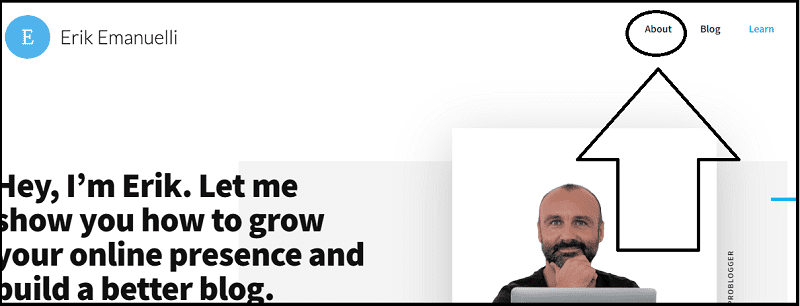
Collaborate With Experts
Google isn’t looking for just any content. It wants professional, knowledgeable contributions from people who know what they are talking about.
Having a diverse range of perspectives adds value to the content and provides credible information that can potentially improve your rankings.
You can reach out to experts in the relevant industry and look for opportunities to collaborate on projects.
When contacting authoritative people in your industry, remember these things:
Create Curiosity
Instead of directly asking for someone to contribute, create curiosity and invite them to find out more.
Try something like this:
- “Contact Name,” Quick Favor?
- Can I Ask You This, “Webmaster”?
- Hi, “Blogger”! “Your Name” here. How are you?
Mention the Name
Make sure to mention the blog or website where you plan on publishing the collaboration.
This will help show that you have a strong presence in your industry and could potentially lead to other opportunities down the road.
Be Honest
When reaching out to experts, it’s important to be honest about who you are and what your intentions are.
Be transparent with what type of content you’re looking for and how they can benefit from participating in this project.
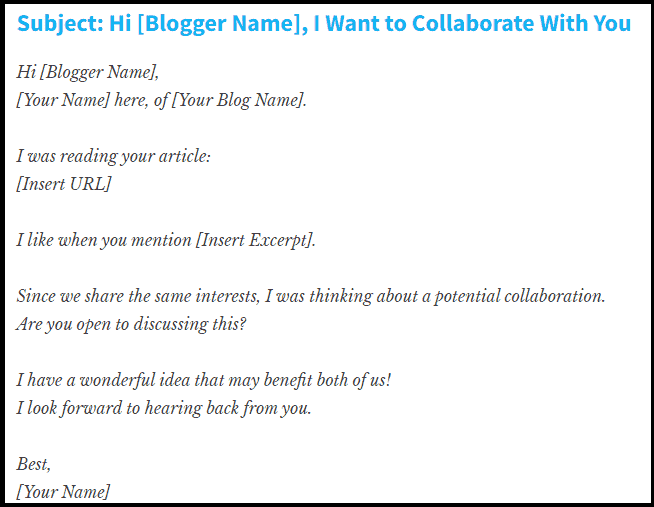
Outreach Reason
Detail why you think their voice is valuable within the topic by citing past experiences, research data, or any other factors that demonstrate why their expertise is needed.
Also, explain what their involvement includes and how much time it will take.
Moderate UGC
User-generated content (UGC) is becoming more and more popular, as it can help businesses build trust and credibility with customers.
However, without proper moderation, UGC can lead to inaccurate, outdated, or even harmful information that could potentially impact your rankings.
Make sure you have a system in place to regularly monitor comments on your site and make updates where necessary.
In addition to this, you should also have clear guidelines for what types of content are allowed on the site. This will help keep trolling or inappropriate posts.

And pay attention to responding to questions right away. This will show users that you care about their opinions and are willing to engage with them.
With WordPress, it’s easy to monitor comments and moderate them.
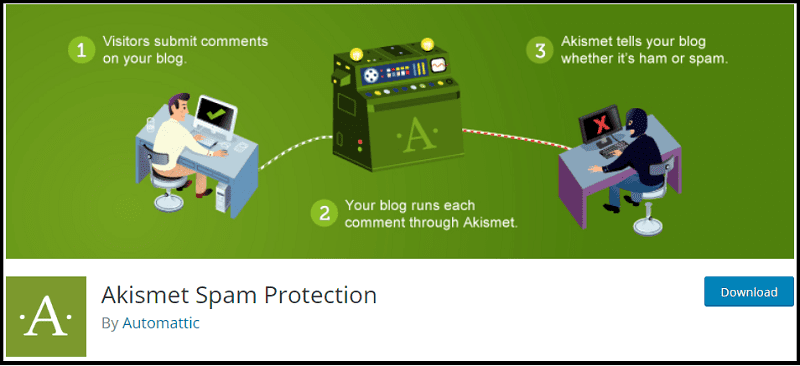
But if you’re using a different platform, make sure to research the best moderation tools so that you can keep an eye on your site’s UGC.
Here are some of the most common spammy comment types:
- Comments With Links or Strange Characters
- Generic Comments
- Comments With Fake Names
Comments With Links or Strange Characters
Comments that include strange characters or links should always be removed from the site, as they can lead to malicious websites.
Generic Comments
Comments that are too generic and don’t add value to the conversation can also be flagged for removal.
Some common examples are “Great article”, or “Thanks for sharing”.
Comments With Fake Names
Lastly, comments with fake names or usernames should also be removed as they can be linked to spam.
It’s easy to sport because often, the name is the website promoted or the company name. Or even just the focus keywords.
Update Old Content
Creating evergreen content is always important, but that doesn’t mean you can forget about it once it’s been published.
As times change, also facts become outdated.
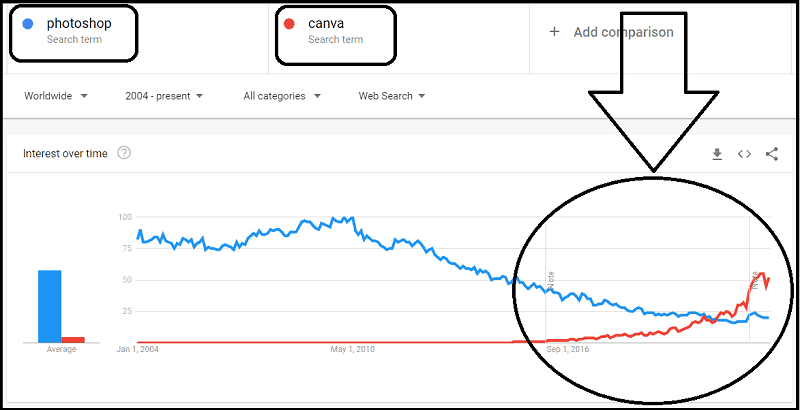
And outdated content can negatively impact your rankings. Then, it’s important to regularly update it with fresh new information.
You can also add new content to existing pages that covers more up-to-date topics and provides additional value to readers.
Make sure you’re properly optimizing the page for both search engine visibility and user experience.
For example, you may want to include relevant external and internal links and optimize the title and meta description.

- Research new, relevant topics that could be added to the page.
- Revisit any outdated facts or figures and update them with the most current information available.
- Check if there are any broken links or images that need to be updated or removed.
- Review the page’s structure and organization to ensure it is easy to read and navigate.
- Re-optimize the page for SEO to maximize its visibility and rankings.
- Add new, high-quality images or videos to enhance the user experience.
In the end,
A website should be informative, engaging, and accurate to keep readers coming back for more!Click To TweetLink to Authoritative Source
Content writing is heavily reliant on sources, as they can have a substantial impact on how your audience perceives you. By including links to external sites, you are also sending signals to Google that these websites are authoritative.
Do some research and find the most relevant and reliable sources available related to your topic. Linking out to industry experts and publications is a great way to add more value to your content.
Including links also helps build relationships with other sites, as they will be likely to mention back to your content in the future. This can help boost your website’s organic traffic.
Finally, always make sure to double-check your sources before linking them. You don’t want to link to sites that are known for inaccurate or misleading information. Doing so could hurt your credibility.
Now, you might be wondering:
What makes a site “Authoritative”?

- High Domain Metrics
- Quality Links
- Market Popularity
- User Trust and Engagement
- Website Traffic
High Domain Metrics
A website’s SEO metrics, such as its Domain Authority (DA), Page Authority (PA), and Trust Flow (TF), are all good indicators of authority.
Sites with higher rankings typically show more trustworthiness and credibility than the ones with lower metrics.

Quality Links
The quality of a website’s backlinks is also an important factor.
Linking to sites with quality backlinks (such as those from reputable websites or industry leaders) is a great way to build trust with readers and show that your content is reliable.

Market Popularity
The popularity of a website in its industry can tell you a lot about its authority.
Look at how many followers they have on social media, blogs, forums, and other outlets. This will help you determine if the site is an important player in its industry.
User Trust and Engagement
It’s important to note that user engagement also plays a role in determining the authority of a website.
If there are lots of comments, likes, shares, and other forms of interaction present on pages belonging to this website it’s a good sign that the content is credible and interesting.
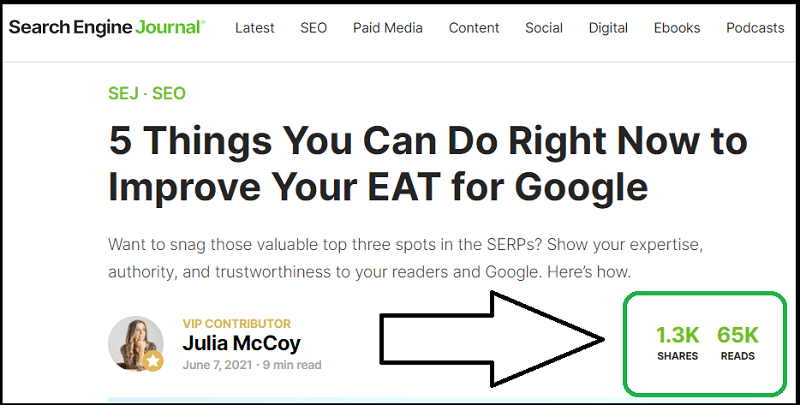
Website Traffic
Finally, look at the amount of traffic the website receives regularly.
Sites with high levels of organic traffic tend to be more popular, which indicates their popularity in their industry.

Consider All Topic Angles
If you’re writing about a subject related to health and wellness, consider looking at all different angles.
For instance, looking into related topics such as nutrition, fitness, mental health, and lifestyle makes you create content that’s more well-rounded and informative, thus helping your website stand out from the rest.
Or, if you are writing about a specific product launch, try to explore the implications it has on various markets and industries or look into how it is impacting people’s lives.
By analyzing the different points of view on the same subject, you can build something more comprehensive and engaging.
Doing this can also help differentiate your content from similar topics published elsewhere on the web. This can be a great way to build credibility on the topic and is the best way to quickly find sources of relevant information.
But wait, there’s more.
Semantic SEO
You can also take advantage of semantic SEO, which means going deep into the topic to provide users with the best possible experience.
Here are some of the best practices to remember when researching and writing your content:
- Use relevant keywords and phrases throughout the piece. Also, remember to include long-tail terms that are related to your topic.
- Make sure each sentence is relevant and informative.
- Leverage techniques such as storytelling and active voice to make your copy more engaging.
- Think of creative ways to keep readers interested in the content, such as the use of bucket brigade words.
- Include visuals like images, videos, infographics, slideshows, etc., which can help break up long blocks of text and add an extra layer of engagement for readers.
Finally, answering the questions customers ask, as found in specific search engine results sections, is a great way to develop your content.

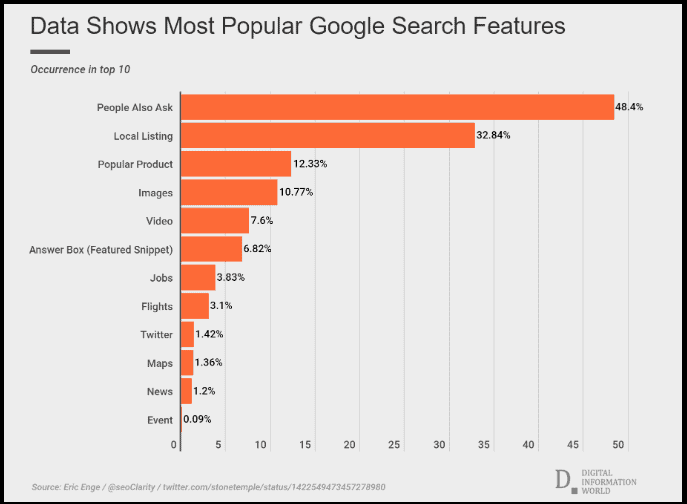
Including responses to your audience’s questions ensures that readers are getting answers to their queries and keeps them engaged with your website.
This can ultimately lead to a better user experience (increased dwell time, reduced bounce rate), which means higher levels of conversion for your business!
Build Your Online Reputation
Building an authoritative, trustworthy website should be one of your main goals (to improve your Google E-E-A-T).
It will show that you are a reliable source of information and will likely help improve your rankings in search engines.
One way to do this is by getting backlinks from high-authority websites.
These links can be built through guest blogging, press releases, or by creating relationships with influential people in your industry.
Or, even better, simply earning them!
Building links will help improve your rankings and show search engines that your website is an authoritative source of information.

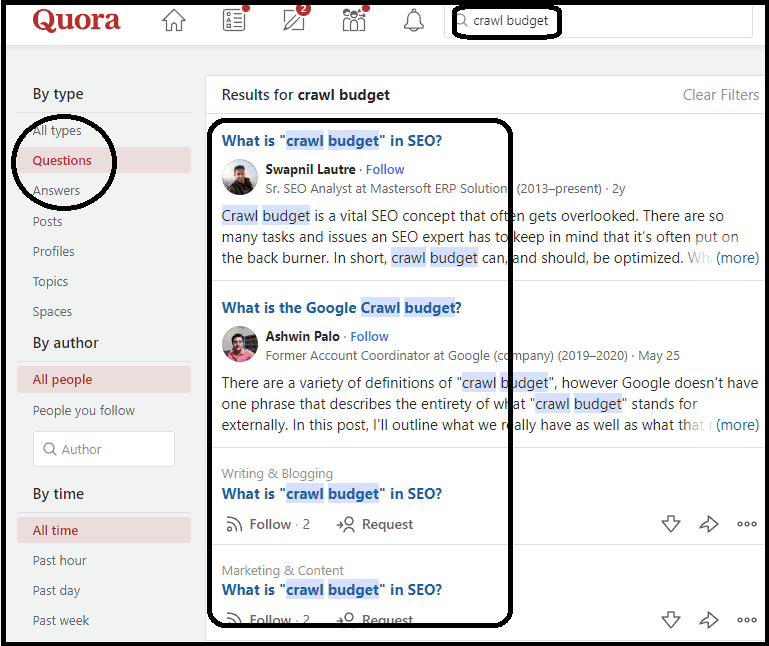
Interacting with site readers, potential customers, and industry influencers can help you build connections which in turn will improve your online reputation.
You can also use this as an opportunity to share your content or to answer any questions people may have.
By engaging with your audience, you can create a community of followers who will be more likely to trust your website and visit it often.
Finally, having an active presence on review sites such as Yelp and Google My Business can be a great way to show users that you are reliable and trustworthy.
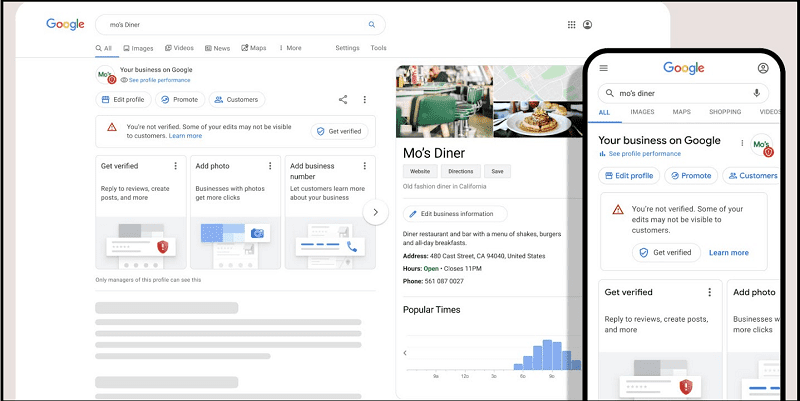
By responding to customer reviews, you can demonstrate your commitment to providing the best service possible.
This will not only help you to improve your customer service but also increase the visibility of your business.
Google E-E-A-T Frequently Asked Questions
There has been much talking about Google E-A-T in the last few years and the recent update to E-E-A-T brought many questions to the table.
Here are some of the most frequently asked ones:
- What is a Google Quality Rater?
- How Do They Influence the Rankings of Every Site?
- How Does Google Know if Content Is Authoritative?
- What Is YMYL?
- Does an E-E-A-T Score Exist?
- What is the Difference Between Experience and Expertise?
- How Does Google Determine If Someone Is a Real Expert in Their Field?
What is a Google Quality Rater?
A Google Quality Rater is a person employed by Google (or by third-party companies reporting to Google) to evaluate the quality of web search results.
They use the guidelines provided by Google to assess how web pages match up to the search query.
How Do They Influence the Rankings of Every Site?
Google Quality Raters use their assessments of web pages to help inform algorithm changes—particularly those relating to E-E-A-T.
Their assessments are used to identify pages that should rank higher or lower, based on the knowledge and expertise of the content.
However, you should know that Google Quality Raters do not directly influence the rankings of any site.
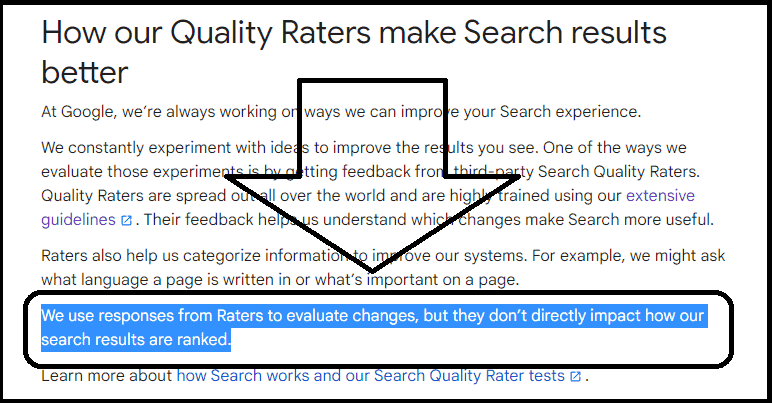
How Does Google Know if Content Is Authoritative?
Google uses several signals to determine the authority of content.
This includes looking at the expertise and trustworthiness of the author, as well as the number of external sources that link to the content.
It also looks at how relevant and in-depth the content is, as well as the number of people engaging with it.
What Is YMYL?
YMYL stands for “Your Money or Your Life.”
It is a term used by Google to refer to content that affects the decisions people make in areas that can affect their health, safety, or financial stability.
Content with this type of impact is held to higher standards, and Google Quality Raters are particularly focused on assessing it.
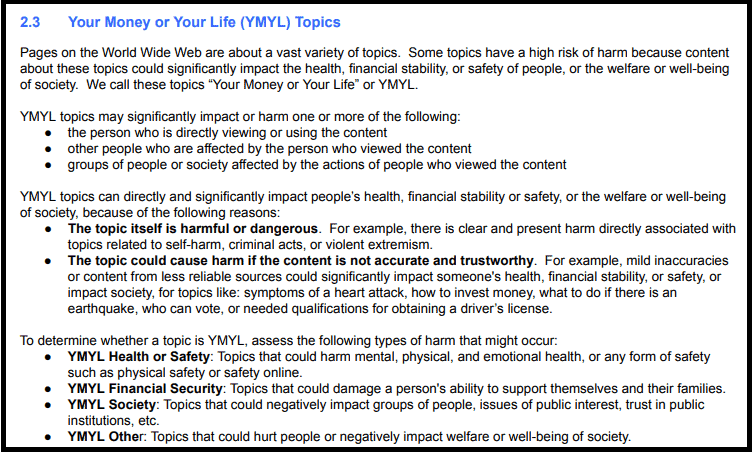
Does an E-E-A-T Score Exist?
No, there is no such thing as an E-E-A-T score.
Google does not provide any kind of numerical ranking system for it.
Instead, it uses its Quality Raters’ assessments to determine how content should rank on the search engine results pages.
It also provides guidelines for creating high-quality content, which is taken into consideration when assessing the quality of a page.
By following these guidelines and building content that is credible, trustworthy, and authoritative, you can help your website rank better on the SERPs.
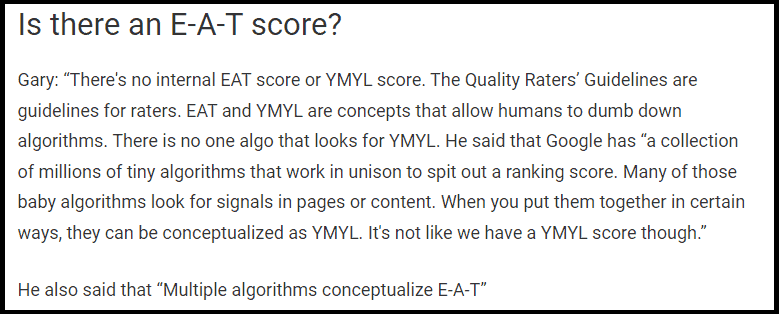
What is the Difference Between Experience and Expertise?
Experience and expertise are both important aspects of demonstrating authority, but they’re not the same thing.
Experience speaks to a person’s past activities and success, while expertise has more to do with their present knowledge.
How Does Google Determine If Someone Is a Real Expert in Their Field?
Google does not have a definitive way of determining who is an expert in any particular field, but they do assess the author’s qualifications and reputation.
This includes looking at their professional credentials, as well as any external sources that link to them and their work.
Google also looks at the quality of content being produced by the author, as well as how many people are engaging with it.
All of these signals combined can be a good indication of whether or not the author is a genuine expert in their field.
Again, ultimately, Google Quality Raters are responsible for making this determination.
Before You Go
Google E-E-A-T is hot in SEO, these days.
But wait, there’s much more you can do to increase your chances of success on the SERPs.
Be sure to keep up with the latest changes and updates to Google’s new guidelines for site owners:
And what about the Google ranking factors? Are you aware of all the confirmed ones?
Finally, don’t miss the opportunity to understand what RankBrain is and how it may affect your content rankings:
Now, it’s over to you.
What do you think?
Do you have something to add or to comment on?
And don’t forget to share the post!

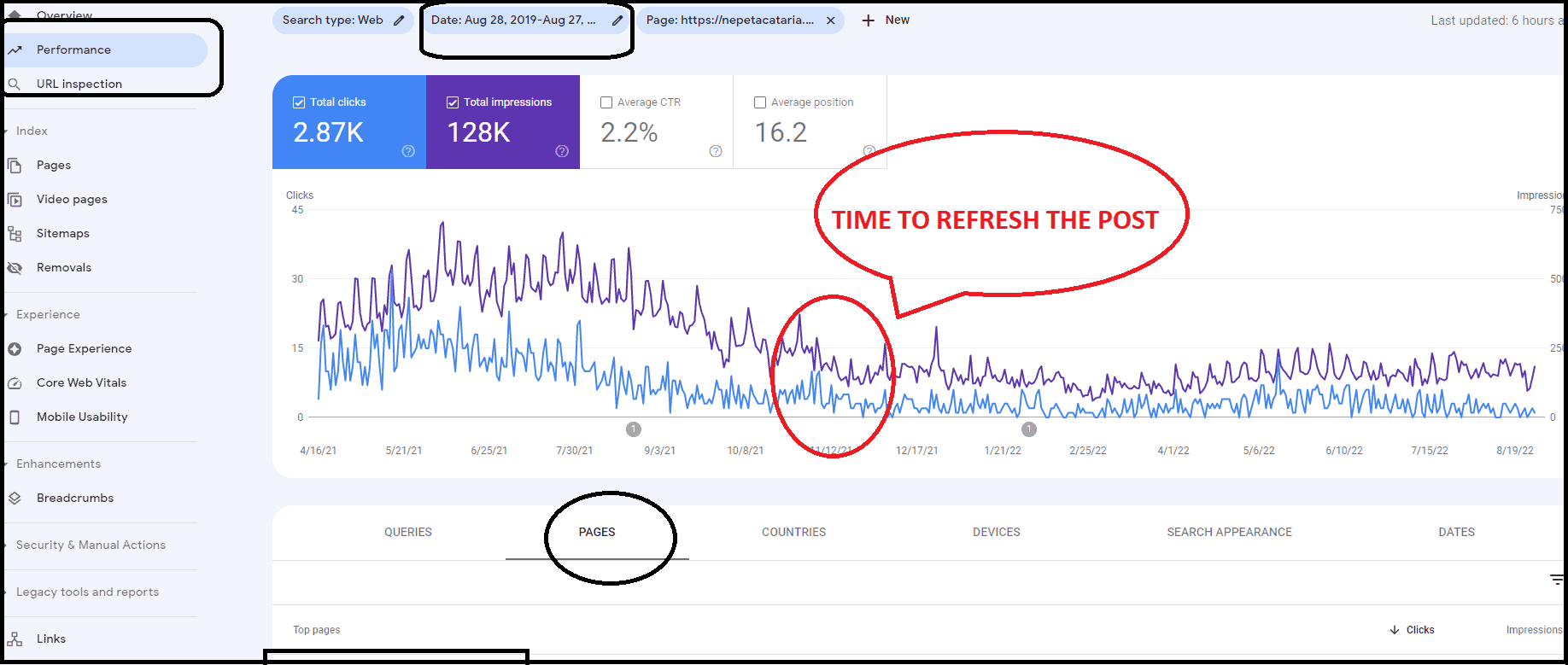
All good points here. Gain trust to curry Google Algorithm favor. Help readers with detailed, targeted blog posts. Make the Google gods happy. Develop skills through patient practice because ranking on the Big G requires mastery; it never happens overnight. Set yearly time frames for optimal results.
I’m with you, Ryan.
And seeing that Google added the extra “E” to E-A-T means that showing proven experience helps with ranking content.
Thanks for stopping by and leaving your thoughts.
Good article. We need to learn Google Algorithm better. Great blog posts btw. thanks
Hi Mandy,
that is a never-ending process, but it’s worth it.
Especially, when you start seeing some good results on your site or content.
Hi Erik.
Thanks for this detailed post.
As someone who is always looking to improve my website’s SEO, I found this blog post to be incredibly helpful in understanding the concept of Google E-A-T and how it can boost my website’s authority.
You did an excellent job of breaking down the different elements of E-E-A-T and how they can be applied to improve my website’s SEO.
I particularly appreciated the emphasis on the importance of Experience, Expertise, Authoritativeness, and Trustworthiness in building credibility and trust with Google and my audience. It makes total sense and these are key factors for any website.
You also offered some great tips on how to demonstrate expertise in my field and create high-quality, informative content to build my website’s authority and trust.
I also found the section on creating a strong About Page and using structured data to be very useful. These are techniques that I have not previously considered and I am excited to implement them on my website.
Thank you once again for sharing.
Thanks for the fantastic comment, Winfred.
It’s rewarding to receive this kind of feedback.
Great to hear you learned a lot from this E-E-A-T guide! 🙂
Hello Erik,
Google has 200+ ranking factors for websites. E.A.T. is a very interesting concept that any webmaster can utilize to rank well in search engines. A Good site architecture, quality content, and a good backlink score can be helpful to boost your website ranking in SERPs. You have elaborated everything in detail.
Regards,
Vishwajeet Kumar
Hi Vishwajeet,
it’s incredible the amount of information there’s about SEO.
The more you dig, the more you discover.
At least, it’s like this for me.
Thanks for checking in and commenting!
Thans Emanuelli once again for this wonderful piece. I have learnt so much in this article.
That’s great to hear you learned something new here.
The purpose of this article is fulfilled. )
Hi Erik,
You knocked it out the park with this entry, it really helped me to better understand EEAT and what I need to do to implement it better on my blog.
It’s amazing (and even a little frustrating) as to the amount of ranking factors for SEO as Vishwajeet pointed out before. So much to learn! Thanks again.
Hi Dani,
thanks for the awesome feedback.
You may want to check this post with the confirmed Google ranking factors:
https://erikemanuelli.com/google-ranking-factors/
Let me know what you think! 🙂
Hi Erik,
Excellent article, I feel that linking out to valuable and authorities sources will indeed be good for E-E-T-A and most importantly.. the reader!
Would you recommend a ‘sources’ section at the end of an article to achieve this? Or perhaps cite sources and link to them within my content?
Cheers!
Hi Andrew,
both putting the link at the bottom of the article or within the content are acceptable. The location of the link does not affect Google’s ranking. Regardless of where it is placed, it will still pass page rank and credit to the website it points to.
In my opinion, it is helpful to have a link to the original source near the context of the article so I can easily access it and find more information. However, this is just a suggestion based on my personal preference and not related to better SEO.
Thanks Erik, I’ll certainly keep that in mind and most likely do a bit of both
Erik, this is a monster resource right here. Thank you for clarifying that E-E-A-T is NOT a ranking factor. And that Google’s raters use that as their quality assurance guideline. It’s a nice checklist for us to make sure we hit all the important marks.
Hi Morris,
good to hear this guide was helpful.
Thanks for the positive feedback!
I wanted to learn about Google’s EAT and had watched videos on this topic on YouTube, but you’ve explained it in great detail, which has helped me understand it better. Thank you.
Hi Abdul, glad to have you helped!
That’s exactly the meaning of this guide.